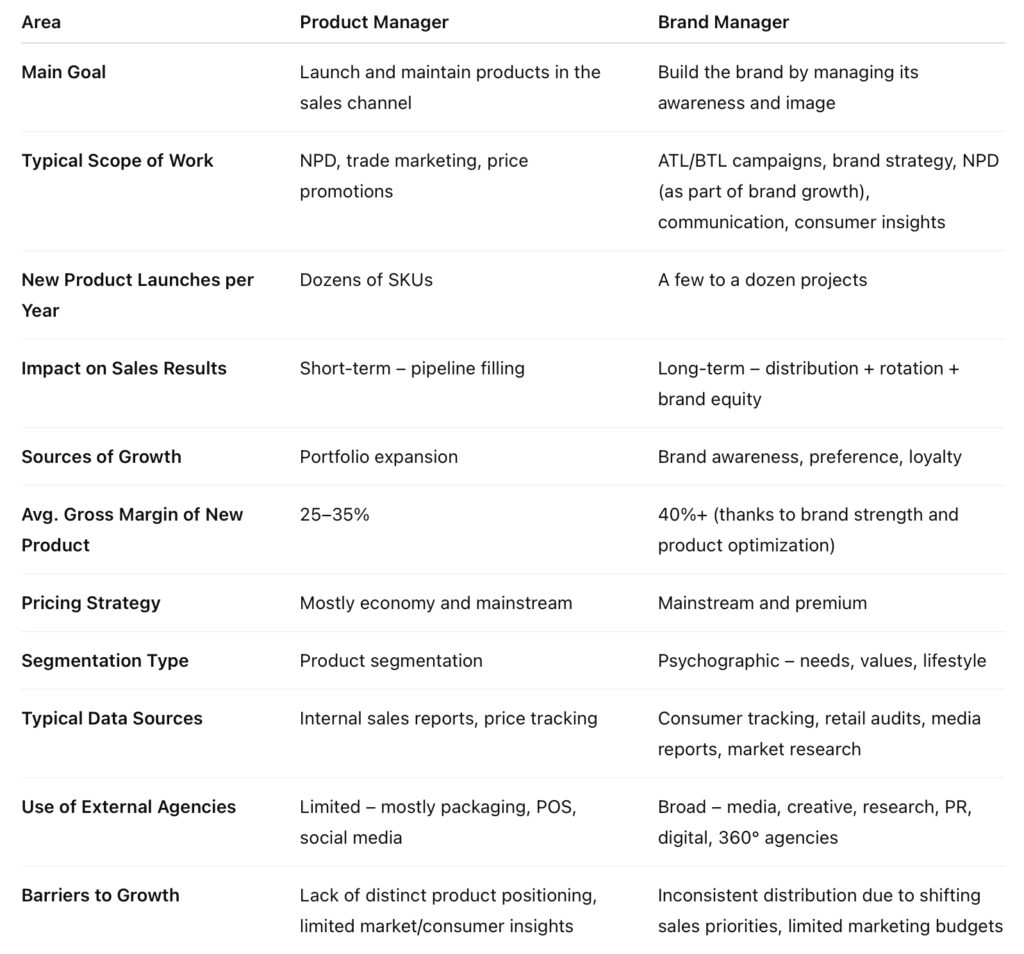
Why do some companies entrust marketing to a Product Manager, while others rely on a Brand Manager? Is it just a difference in job titles – or something more?
From my experience, this distinction says a lot about how a company approaches marketing, how teams operate, and how decisions are made. And that has a direct impact on what skills you develop, what you can influence, and how your marketing career unfolds.
In theory, it sounds simple – one manages the product, the other the brand. In practice, however, their scope of responsibilities, decision-making power, and success metrics can differ significantly – especially in FMCG and consumer goods companies.
In this article, I’ll show you what these roles really look like from the perspective of daily tasks, objectives, and challenges. This is not textbook theory – it’s hands-on insight that can help you choose the right direction for your career.
1. Scope of responsibility: Product vs. Brand
A Product Manager focuses on specific products or product lines. Their main tasks include new product development (NPD), market launches, and supporting sales through trade marketing activities.
A Brand Manager, on the other hand, oversees not only the product but also brand awareness and image – in other words, how the brand is perceived emotionally and functionally by consumers.
2. In what types of companies do these roles exist?
Brand Managers are typically found in companies that:
- Invest heavily in building strong brands
- Allocate >5% of revenue to marketing
- Run large-scale advertising and promotional campaigns
These are usually category leaders – e.g., in chocolate: Wedel, Milka, Wawel; in coffee: Tchibo, Jacobs; in juices: Tymbark, Hortex.
Product Managers are found almost everywhere. In most companies, marketing focuses more on product and pricing, without major communication budgets. Operational efficiency is what really counts here.
3. Role comparison – summary table

4. Why is this comparison important?
In practice, many companies use these titles interchangeably, which leads to confusion, inefficiencies, and blurred responsibilities. Understanding the difference helps build more effective marketing team structures and make better hiring decisions.
5. What does this mean for your marketing career?
Choosing between a Product Manager and Brand Manager role is more than a matter of job title – it’s a decision that can shape your entire professional path.
If you’re drawn to brand strategy, communication, and working with agencies, the Brand Manager track is for you. It’s a path for those who think long-term, want to build powerful brands, and influence consumer perception.
If you prefer product ownership, pricing, innovation, and collaboration with sales, then the Product Manager role is a better fit – letting you develop operational, analytical, and commercial skills.
Importantly, neither role is “better” or more prestigious. They’re just different. The key is to choose the kind of environment that will teach you what you really want to learn – and open doors to future career opportunities.
And if you’re just starting out – ask yourself:
👉 Do I enjoy building brands more, or managing products?
That may turn out to be the most important question in your marketing career.
📩 Stay ahead with marketing insights
📬 Subscribe to my newsletter – every week I share proven tips, case studies, and tools to help you grow your marketing skill set. Subscribe below the article.
SEO Keywords:
product manager vs brand manager, brand manager role, difference product brand manager, FMCG marketing, product management in practice, product manager tasks, brand manager responsibilities

